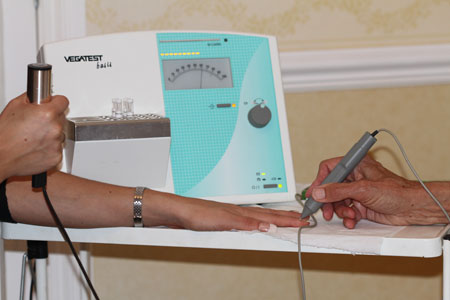Bournemouth Allergy Test Clinic
We can test up to 300 substances ranging from cereal and dairy products to pets, pollens and chemicals. Even drinks such as coffee, tea and fruit juice may provoke unsuspected allergic reactions.
Testing for food allergy or intolerance
Because reactions cannot otherwise be diagnosed it is important to test for a food allergy or intolerance.
An efficient way of detecting allergy or intolerance is with the Vegatest. Up to 300 substances ranging from cereal and dairy products to pets, pollens and chemicals can be tested for. Even drinks such as coffee, tea and fruit juice may provoke hitherto unsuspected reactions.
The test unit (pictured) measures the body's reactions to potential allergens. The test is totally painless and involves a probe which lightly touches a fingertip or toe.

No injections, no patch tests are needed!
Today's modern diets and lifestyles mean that many of us are eating the wrong foods for our individual bodies and causing digestive disorders, which in turn, can lead to more serious complaints and illnesses. Following is a list of common allergy related disorders:
- IBS
- Headaches
- Migraines
- Tiredness
- Fatigue
- Weight Problems
- Eczema
- Skin complaints
- Asthma
- Arthritis
- Catarrh
- Sinus congestion
- Anxiety
- Depression
- Hyperactivity
What is the difference between food allergy and food intolerance?
Allergic reactions are often caused by the proteins in foods, which may resist cooking, stomach acids and digestive enzymes. They may then enter the bloodstream and cause reactions throughout the body. These proteins may stimulate the production of antibodies specific for each particular protein. Every time the protein is eaten it triggers these antibodies to release histamine and other substances. This in turn produce localised inflammatory reactions.
Many different symptoms may then appear such as hives, eczema, nausea, asthma, headaches, etc. Common foods involved may be shellfish, nuts, eggs and peanuts. In children, allergies also occur due to fish, soya and cows’ milk. Pollen reactions, of course, produce hayfever.
Food intolerances are more difficult to detect and occur when a component of a particular food or drink irritates the digestive system. The body is then unable to break this component down. Intolerances are far more frequent than allergic reactions and may be produced by many foods.
This reaction may closely resemble those of an allergy, but digestive upsets and headaches are telltale symptoms. Dairy products, cereals and alcohol, are frequently responsible. The flavouring agent, monosodium glutamate, tartrazine and even caffeine are other possible causes. Spray-on preservatives and fertilisers may also affect seemingly normal foods, which may then trigger intolerance reactions. Lactose (cow’s milk) intolerance may cause abdominal pain and diarrhoea. As many as one person in ten may suffer from this.
If you would like to find out more about allergy testing, complete the form below or get in touch.
To discuss any of the treatments offered in more detail please feel free to get in touch by phone or email, we look forward to hearing from you!
Address: 55 Howard Road, Queens Park, Bournemouth, BH8 9EA
Mobile: 07464 621 361
Email: [email protected]